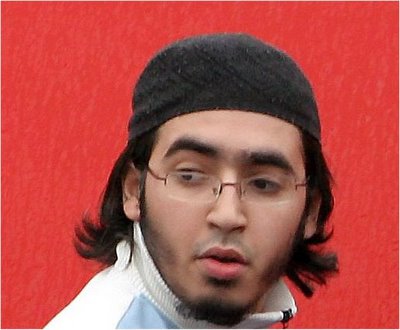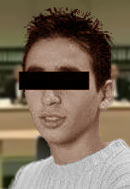
Samir Azzouz, a young Dutch-Moroccan accused of plotting attacks on government buildings, Amsterdam's Schiphol airport and a nuclear reactor was acquitted by the Dutch court of appeals on Friday
Rene van Boven, the magistrate in charge of the case said, "The court does not doubt the terrorist intentions of the defendant but that that does pose a real threat of an attack."
Azzouz, 19, was arrested last year. He was accused of for illegal possession of weapons, namely machine-gun ammunition, a bullet-proof vest, two mock explosive devices, a silencer, maps and sketches of prominent buildings at his home.
Azzouz' arrest - and particularly the discovery at his house of plans, maps and other detailed information of concrete targets, including the nuclear reactor at the south-western town of Borssele, Parliament House, and the headquarters of the AIVD secret service at Leidschendam - prompted the Dutch government to issue a heightened security alert.

In detail he was found with:• Maps and/or pictures and/or drawings of several government buildings, including Parliament, nuclear power plant Borssele, the ministry of Defence, Schiphol Airport, Dutch Intelligence Agency (AIVD), Dutch Special Forces HQ
• Notes describing necessities which would be needed to carry out these (terrorist attacks, AD) crime/crimes
• Notes describing routes to these buildings and/or circumvention of the security facilities around these buildings.
• Document entitled 'Advice for those who refrain from strife on the way to Allah', encompassing an explanation of the call for Jihad and martyrhood
• A memorandum containing the address of a website, namely www.geocities.com/m_13dad, which contained a 'Manual for preparation' for the Jihadi ranks, illustrating the use of (amongst others) weapons and/or night vision goggles and/or silencers and/or the fabrication of such and/or guerrila warfare and/or military operations.
• A diary containing the address of a website, www.geocities.com/sluitjeaan (sluitjeaan is Dutch for 'join up with us', AD)
• Notes describing the chemical formula of RDX, an explosive compound
• Discs containing 'video testaments' which rally for the Jihad, the murder of Americans, Jews and non-Arabs
• Files explaing how a Muslim should enter the battlefield
• Two clip holders for automatic firearms
• A silencer for an automatic firearm
• One or more soldered electrical circuits
• A bulletproof vest
• Night vision goggles
• Ammonia
• Hydrochloric acid
Also, Azzouz had travelled to Chechnya before to join up with Islamic militants there. On top of that, the judges were presented with loads of phone taps in which Azzouz spouted Jihadi texts. Nevertheless, the court concluded that 'apparently was more interested in religous extremism' than most people.
Azzouz was jailed for three months, but on April 6, he was acquitted. Rotterdam court said there was not enough evidence to convict him.
However, he was rearrested in October, along with six other suspected Islamic militants. They were suspected of planning to attack politicians and government buildings. Samir Azzouz appeared to be only a cog in the wheel of a much larger international terrorist ring, which includes the names of key figures of the Moroccan Islamic Combatant Group (GICM) and its off-shoot Martyrs for Morocco, both affiliated with al-Qaeda.
In related news: The trial of 13 Belgian terror suspects linked to bomb attacks in Morocco and Madrid officially started in Brussels Court on Wednesday.
The men were accused of links to the terror network Moroccan Islamic Combatant Group (GICM) which is suspected of being responsible for the Casablanca bomb attacks in Morocco in May 2003 and the Madrid train bombings in Spain in March 2004. The suspects were arrested in Maaseik and Brussels between March and July last year on allegations they provided logistical support to the GICM.
One of the Belgian suspects is accused of assisting the Casablanca bombers, while the group is accused of providing logistical support for the Madrid bombings.
Some 17 suspects faced legal proceedings in August, 13 of whom were ordered to stand trial. A total of 11 suspects appeared at the procedural hearing at the start of this month.
Defense lawyers claimed two weeks ago that while the men sympathize with the GICM, they are not active members of the organization and are certainly not terrorists.
The trial represents the first time that a special terrorism law enacted in 2003 will be applied. The new law could result in the men being jailed for up to 10 years if convicted of belonging to a terrorist organization. Tight security will be in force around Brussels Court for the duration of proceedings. The trial will involve four days of hearings each week, with a fifth day reserved to clarify matters if needed.
The trial is scheduled to continue until 13 December, but may extend beyond that date.
Tags: Morocco, Fes, Jihad, Terrorism,

3 comments:
I certainly agree. We all need to take responsibility.
It is possible that when they leave Morocco they expect to have a much better life. Then they find it is not true - true happiness is not about money but a sense of family and community. If the fail to gain their dreams they are able to be targetted by the extremists who use young people with lost dreams to give their lives for a peverted version of religion. Maybe?
It is possible that his parents did not integrate into Dutch society and left him feeling an outsider? Or maybe he was just a really mixed up young man and has religion and background had little to do with it? I agree it is perplexing!
Post a Comment